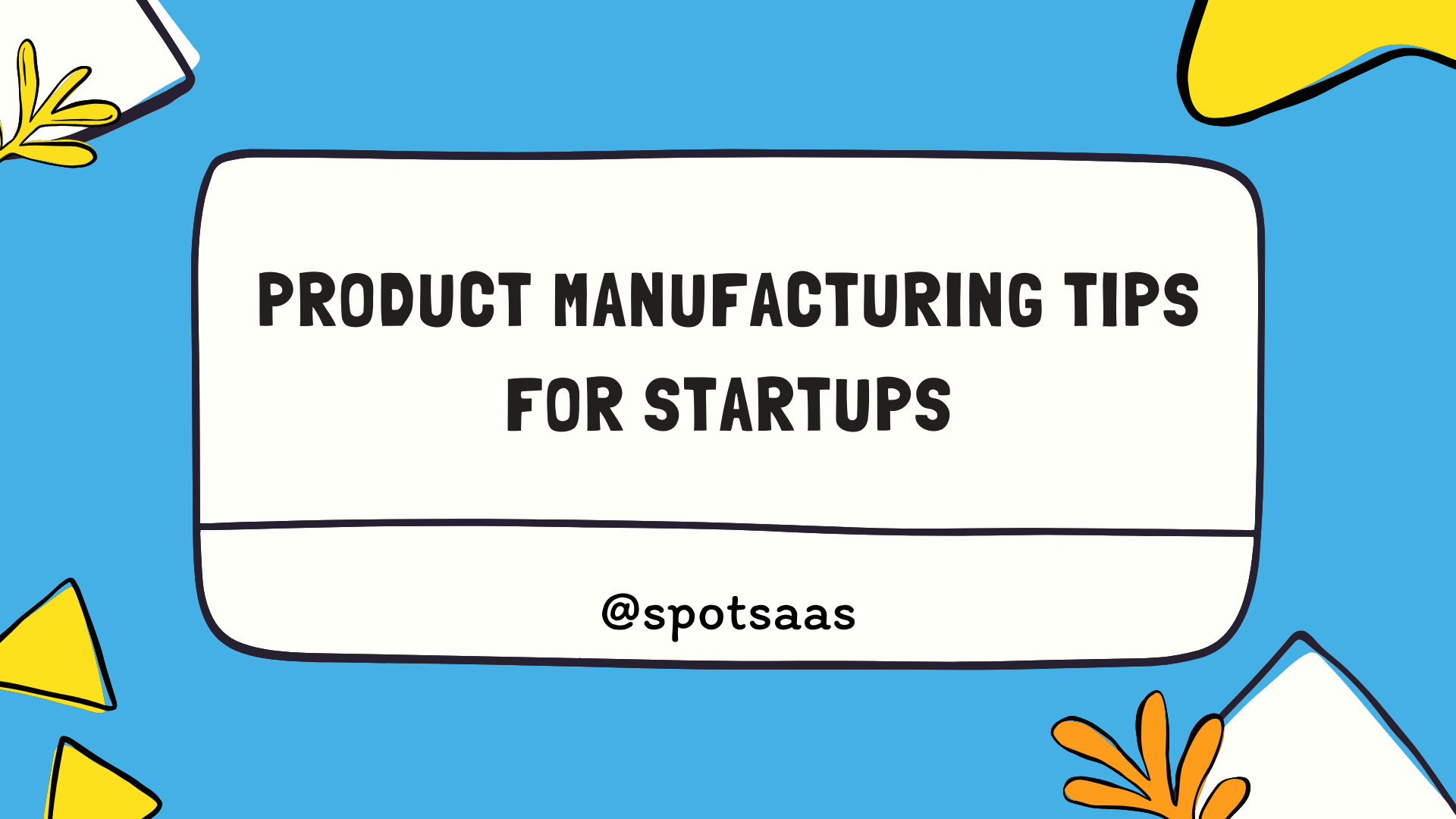Ever found yourself, as a budding entrepreneur, brimming with an exclusive product idea but scratching your head over how to bring it into the physical world?
As per recent studies, nearly 84% of startups fumble due to mishaps in their production process.
In this blog post, we’ll take you by the hand through a detailed guide to help you smoothly navigate these choppy manufacturing waters so your innovative concept can see the light of day.
Key Takeaways
- Consulting experienced individuals and seeking advice from seasoned professionals can provide valuable guidance for startups in the manufacturing industry.
- Thorough research on materials is crucial for identifying the best resources that offer quality, durability, and cost-effectiveness for product manufacturing.
- Creating prototypes allows startups to test and refine their products before mass production, saving time and money in the long run.
- Finding reliable manufacturers who have experience and technical know-how is essential for ensuring high-quality products that meet customer standards.
- Planning logistics and testing thoroughly are key steps in successfully manufacturing a product for a startup, including considerations like packaging, shipping methods, inventory management, quality control checks, user testing, and obtaining feedback.
The Importance of Manufacturing for Startups
Manufacturing for startups is like the heart in a body, pumping life into every aspect of the business. It’s through this process that a startup turns its unique ideas into physical products ready for market consumption.
From research to prototyping, manufacturing breathes life into innovation.
Moreover, it affects not only product quality but also your startup’s overall growth and success. Choosing materials wisely can save costs while ensuring durability and function. Prototyping provides an avenue for testing and refinement before launching full-scale production, thus reducing risks and potential losses associated with faulty design or functionality.
Efficient manufacturing directly influences turnaround times, enabling you to meet demand promptly. This could give your startup a competitive edge in fast-paced markets where new trends emerge frequently.
Plus, having control over the manufacturing process bolsters strategic planning by providing accurate estimates on production timeframes—essential information needed for sound decision-making.
It goes without saying; that maintaining robust relationships with reliable manufacturers is vital—they are the people turning your concepts into actual goods after all! Hence their expertise can profoundly influence both product quality and customer satisfaction.
As well as contributing to business sustainability via adaptation to changing market demands through constant innovation—the backbone of any thriving venture these days! And let’s not forget about cash flow challenges; wise management of manufacturing operations will significantly alleviate those too!
But remember one thing though:
Rome wasn’t built in a day, and neither should your initial manufacturing processes be if you aim for long-term success. In today’s competitive global economy, which is continuously shaped by digital advancements, businesses face immense pressure. This new landscape challenges the traditional ways businesses operate.
Making a mistake in this fast-paced environment can have long-lasting effects on future plans. The choices we make now will impact not only us but future generations. They are waiting to see if these decisions ensure our survival or lead to our downfall, no matter what the future holds.
Check out Katana Manufacturing ERP for startup.
7 Steps to Successfully Manufacture a Product for Your Startup
Consult with experienced individuals, conduct thorough research on materials, create a prototype, find a reliable manufacturer, and plan logistics and testing. These steps are crucial to successfully manufacturing your product for your startup.
Consult with experienced individuals
It’s my firm belief that seeking advice from seasoned people in the field is a pillar of success for startups. Whether it’s a product manufacturing specialist or an entrepreneur who has navigated the terrain before, their insights can provide invaluable guidance.
They might be able to help you anticipate challenges, negotiate better deals with vendors and inject efficiency into your production process.
Moreover, pooling wisdom from various individuals helps build a broad knowledge base for your startup manufacturing strategies. It refines decision-making and stimulates strategic planning that aligns with industry trends and standards.
You’ll glean important tips like preparing for cash flow challenges that are often overlooked but essential to weathering the initial stages of growth. A mentor brings not just expertise but also bridges gaps in experience—a double win for fledgling businesses staring at high stakes.
Identifying the best materials for your product is a critical part of the manufacturing process. I delve into extensive research to pinpoint materials that offer quality, durability and cost-effectiveness.
From plastics to metals or fabrics, each material has its own functions and costs associated with it. I analyze these characteristics while keeping our production goals in mind. Ensuring sustainability also plays a vital role in selecting resources, as this directly impacts customer satisfaction and environmental footprint.
This careful selection promotes an efficient manufacturing process that aligns with strategic planning aimed at business growth. In my startup journey, investing time in comprehensively researching potential materials pays off in maintaining product quality and positive consumer perception.
Check out The Best Inventory management software in 2023
Create a prototype
Creating a prototype is a vital step in the product manufacturing process for startups. It allows us to test and refine our product before moving on to mass production. By creating a prototype, we can identify any design flaws or areas for improvement early on, saving time and money in the long run.
It also helps us gather valuable feedback from potential customers and investors, which can guide further development of our product. A well-executed prototype demonstrates our commitment to quality and innovation, giving us a competitive edge in the market.
Find a reliable manufacturer
Finding a reliable manufacturer is a crucial step for startups looking to successfully manufacture their products. It’s important to find a manufacturer who has experience and technical know-how in your industry, as this will ensure that they understand the specific requirements of your product.
Quality and reliability are also key factors to consider when choosing a manufacturer, as you want to ensure that the final product meets your standards and that they can deliver consistently.
Turnaround times should also be taken into account, as delays in production can impact your business operations and customer satisfaction. By carefully selecting a reliable manufacturing partner, you can have confidence in their ability to produce high-quality products efficiently and meet the demands of your growing startup.
Plan logistics and testing
Planning logistics and testing is a crucial step in successfully manufacturing a product for your startup. Once you have finalized the design and found a reliable manufacturer, it’s important to plan how the product will be transported, stored, and distributed efficiently.
This includes considering factors such as packaging, shipping methods, and inventory management to ensure smooth operations. Additionally, thorough testing of the product is necessary to identify any potential issues or improvements before mass production.
This can involve conducting quality control checks, user testing, and obtaining feedback from trusted individuals or focus groups. By carefully planning logistics and conducting comprehensive testing, you can optimize your manufacturing process and deliver a high-quality product to your customers.
| Key Action | Description |
|---|---|
| Consult with experienced individuals | Seek advice from seasoned experts to gain invaluable guidance, anticipate challenges, and refine decision-making. |
| Conduct thorough research on materials | Select materials that offer quality, durability, and cost-effectiveness while considering sustainability and aligning with production goals. |
| Create a prototype | Test and refine the product before mass production, identify flaws, and gather feedback for further development. |
| Find a reliable manufacturer | Choose a manufacturer with experience, technical know-how, quality, reliability, and efficient turnaround times. |
| Plan logistics and testing | Plan for transportation, storage, and distribution. Conduct quality control checks, user testing, and obtain feedback before mass production. |
Factors to Consider When Choosing a Manufacturing Partner
When choosing a manufacturing partner for your startup, it is important to consider factors such as their experience and technical know-how, the quality and reliability of their work, and their turnaround times.
Experience and technical know-how
Having experience and technical know-how is crucial for startups in the manufacturing industry. It allows entrepreneurs to navigate the complexities of production processes more efficiently.
This expertise enables them to make informed decisions about material selection, equipment usage, and quality control measures. With experience and technical know-how, startups can avoid costly mistakes and ensure that their products are developed and manufactured with precision and excellence.
Additionally, this knowledge helps in finding reliable manufacturers who understand the specific requirements of the product concept. By leveraging experience and technical know-how, startups can establish themselves as credible players in the market and achieve sustainable business growth.
Quality and reliability
Quality and reliability are two crucial factors to consider when choosing a manufacturing partner for your startup. Ensuring that your product meets high-quality standards is essential to gain customer trust and satisfaction.
Look for a manufacturer with experience and technical expertise in producing similar products, as this can greatly impact the quality of your end product. Reliability is also important, as you want a manufacturer who can consistently meet production deadlines and deliver on time.
By prioritizing quality and reliability, you can establish a strong foundation for your startup’s success in the market.
Turnaround times
Finding a manufacturer with quick turnaround times is crucial for startups in the manufacturing process. Efficient production and delivery can help businesses meet customer demands, stay competitive, and drive business growth.
When partnering with a manufacturer, it’s important to consider their track record in meeting deadlines and their ability to handle high volumes of production. By working with a manufacturer that prioritizes fast turnaround times, startups can ensure that their products are delivered on time and maintain a positive reputation in the market.
It’s also wise for entrepreneurs to establish clear communication channels with manufacturers to stay updated on progress and address any potential delays promptly. Keeping an eye on manufacturing partners’ turnaround times will ultimately contribute to the success of startup ventures.
Expert Tips for Boosting Your Startup’s Manufacturing Process.
Constant innovation is key to boosting your startup’s manufacturing process. By implementing new design tools and technologies, you can improve the efficiency and accuracy of your product development process.
This will help you stay competitive in the market and meet the evolving needs of your customers. Additionally, focusing on improving the design of your product can lead to better functionality, aesthetics, and customer satisfaction.
Introducing new products to your lineup is another effective way to boost your manufacturing process. This allows you to expand your offerings and attract a wider range of customers.
Finally, it’s important to prepare for cash flow challenges that may arise in the early stages of starting a manufacturing business. By planning ahead and having a solid financial strategy in place, you can ensure the long-term success of your startup.
| Key Aspect | Description |
|---|---|
| Experience and technical know-how | Enables efficient navigation of production processes, informs decisions on materials, and establishes credibility in the market. |
| Quality and reliability | Essential to gain customer trust, and prioritize when choosing manufacturing partners to ensure product standards and timely delivery. |
| Turnaround times | Crucial for timely product delivery, competitiveness, and maintaining reputation. Ensuring clear communication with manufacturers can mitigate potential delays. |
| Constant innovation | Implementing new tools and technologies for efficiency and accuracy in the manufacturing process. It helps in remaining competitive and meets evolving customer needs. |
| Introducing new products | Expanding the product lineup attracts a wider customer base and provides more offerings. |
| Preparation for cash flow challenges | Planning finances and having a strategy in place ensures long-term success and sustainability. |
| Focus on design | Improves product functionality, and aesthetics, and ensures higher customer satisfaction. |
Conclusion
In conclusion, effective product manufacturing is essential for the success of startups. By consulting experienced individuals, conducting thorough research on materials, creating prototypes, finding reliable manufacturers, and planning logistics and testing, startups can navigate the challenges of manufacturing with confidence.
Additionally, considering factors such as experience, quality, reliability, and turnaround times when choosing a manufacturing partner will contribute to efficient production processes.
Implementing expert tips and strategies will help startups boost their manufacturing process and drive business growth.
Few software that might help you kickstart your Inventory management / Product manufacturing software –
Zoho Inventory, In-flow Inventory, Trade Gecko, Plex Manufacturing Cloud.
FAQs
1. How do I choose the right manufacturer for my startup?
To choose the right manufacturer for your startup, research and compare different options based on their expertise, experience, references, production capabilities, and cost.
2. What factors should I consider when deciding on a manufacturing location?
When deciding on a manufacturing location for your startup’s product, consider factors such as proximity to suppliers and customers, transportation costs, labour availability and cost, infrastructure, and regulatory environment.
3. How can I ensure quality control during the manufacturing process?
Ensure quality control during the manufacturing process by setting clear product specifications and standards, conducting regular inspections at various stages of production, implementing proper testing procedures, and having effective communication with the manufacturer.
4. What are some cost-saving strategies for product manufacturing?
Some cost-saving strategies for product manufacturing include optimizing material usage through design improvements or bulk purchasing discounts, streamlining production processes to reduce labor or time wastage, exploring outsourcing possibilities if applicable to your business model or negotiating favorable terms with suppliers.
5. How long does it typically take to manufacture a product from start to finish?
The time it takes to manufacture a product from start to finish varies depending on factors such as complexity of the product design and production volume. It is recommended to work closely with your chosen manufacturer to determine an estimated timeline based on your specific requirements.




